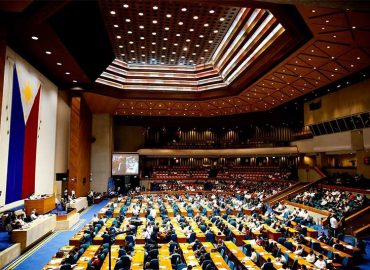By Denise A. Valdez, August 7 2019; Business World
https://www.bworldonline.com/dict-may-issue-new-common-tower-policy/
Image Credit to Business Mirror
THE government is considering putting out a new draft policy on telecommunications infrastructure sharing in the next two months, after stakeholders sought firmer guidelines before committing major investments.
The Department of Information and Communications Technology (DICT) announced its plans yesterday at a stakeholders’ meeting for the common tower industry, which will help telecommunications firms roll out infrastructure faster and more cheaply.
“May draft na tayo na policy [We’ll have a draft policy]… two months, or even sooner,” DICT Secretary Gregorio B. Honasan II told reporters yesterday.
Representatives from Globe Telecom, Inc.; Smart Communications, Inc. and Dito Telecommunity Corp. (formerly Mislatel) joined the meeting, along with the 24 tower companies that signed memoranda of understanding (MoUs) with the DICT to enter the market for common towers.
DICT Undersecretary for Operations Eliseo M. Rio, Jr. presented what the agency has so far drafted for the new policy, such as provisions requiring towers to be built within a given radius apart from one another.
It is also considering requiring telcos to come up with a yearly rollout plan that will be given to tower companies. While telcos will be allowed to build their own towers, the government will only support towers that will be built by independent tower providers.
Other policies the DICT is looking at is subsidizing towers that will be built in missionary areas.
Aside from the department’s efforts and the comments it is getting from stakeholders, Presidential Adviser Ramon P. Jacinto said he also submitted his own draft proposal for the policy.
Mr. Rio said this new draft now allows up to five tower companies to be registered, opposed to only two as indicated in Mr. Jacinto’s previous draft presented last year. However, it still restricts telcos from building their own towers.
DICT Secretary Gegorio B. Honasan said Mr. Jacinto’s draft, along with the comments of telcos and tower providers, are all being considered by the DICT.
Last month, Mr. Rio said the entry of tower companies since December shows there may be no need to come up with concrete rules on tower sharing anymore.
But he said yesterday there was a “clamor” from stakeholders to come up with a clear policy. “That was an opinion that there may be no need (for a common tower policy) dahil successful naman ito[because the status quo has been successful]. But… there’s a clamor,” he said.
William Walters, managing director for the joint venture of Malaysia’s edotco Group Sdn. Bhd. and the Philippine firm ISOC Infrastructure, Inc., said yesterday a common tower policy is necessary to increase investment in the industry.
“Although we’ve signed MoUs with some of the operators here, we would still like to see the common tower policy formalized in order for us to make any large-scale investments,” he said.
Manish Kasliwal, chief business officer in Asia of American Tower Corp. subsidiary ATC Asia Pacific Pte. Ltd., concurred. “We are looking for an independent tower company policy which is something that is predictable, something we can depend on. For us, as investors, something that is very important is it (the rules) does not change very quickly,” he said.
Globe President and Chief Executive Officer Ernest L. Cu said earlier this week that it is difficult for telcos to enter into the tower sharing business with no concrete rules.
Mr. Honasan said while the DICT believes a comprehensive law is necessary for common towers, the immediate need for more cell sites calls for speedier action from the agency,
“Driven by a very tight and urgent timeline, we are opting for more action generated by executive action. It is our hope that the issuances will not be diametrically opposed to any comprehensive law that will follow soon after,” he said.
“We’re assuming that through executive action, we’ll cut through the self-inflicted bureaucracy,” he added.
The concept of tower sharing is being pushed by the DICT to improve tower density, which it said is one of the lowest in the region at 4,000 subscribers per tower. Allowing common towers means more than one telco can use a single tower, thereby increasing the number of subscribers being served by each tower. — Denise A. Valdez


